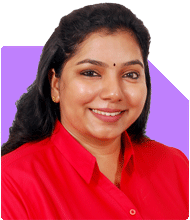Fighting Hair Loss at 32: Can Yoga Help?
Pushpa R |58 Answers |Ask -Follow
Yoga, Mindfulness Expert - Answered on Oct 15, 2024
In the last 10 years, she has trained over 400 people in yoga and counselled many others at corporate events.
She holds a master of science degree in yoga for human excellence from Bharathidasan University, Trichy.
Pushpa specialises in meditation, yoga for wellness and mindfulness.... more

I am 32 and facing extreme hair fall and grey hair. I have tried all kinds of oil and medication. Nothing is working. I recently read that yoga can help reduce hairfall. Is this true? What exercises can I do to prevent and reduce hairfall?
Parvatasana (Mountain Pose): Enhances circulation to the head and strengthens the spine.
Mahamudra: Improves digestion and removes toxins, promoting healthy hair.
Ustrasana (Camel Pose): Increases blood flow to the scalp and nourishes hair follicles.
Paschimottanasana (Seated Forward Bend): Stimulates the scalp and boosts hair growth.
Along with yoga, maintaining a healthy diet and practicing meditation can further support hair health. However, it's essential to consult a yoga guru for personalized guidance and to ensure you're doing the poses correctly.
R. Pushpa, M.Sc (Yoga)
Online Yoga & Meditation Coach
Radiant YogaVibes
https://www.instagram.com/pushpa_radiantyogavibes/
You may like to see similar questions and answers below
Roopashree Sharma |189 Answers |Ask -Follow
Yoga, Naturopathy Expert - Answered on May 24, 2022
Roopashree Sharma |189 Answers |Ask -Follow
Yoga, Naturopathy Expert - Answered on Oct 21, 2022

Hairfall could be a result of multiple reasons, ranging from hormonal changes to lack of nutrition.
If it’s sudden and constant, you can get a routine body check up done.
You should ensure a healthy and nutritional diet with more fresh vegetables and greens; continue taking external care like oiling once a week to enhance growth.
Comb your hair before sleeping for better circulation. You can use a neem comb as it is antiseptic; choose one with smooth edges.
Exercising is equally important for better blood circulation as well as balancing hormones.
Lastly, don’t overstress about your hair loss.
Start doing relaxing pranayams like Anulom Vilom for 10-20 minutes every morning or before going to bed.
Roopashree Sharma |189 Answers |Ask -Follow
Yoga, Naturopathy Expert - Answered on Aug 10, 2024
Komal Jethmalani |382 Answers |Ask -Follow
Dietician, Diabetes Expert - Answered on Dec 06, 2024
Nayagam P P |4417 Answers |Ask -Follow
Career Counsellor - Answered on Apr 12, 2025
Nayagam P P |4417 Answers |Ask -Follow
Career Counsellor - Answered on Apr 12, 2025
Nayagam P P |4417 Answers |Ask -Follow
Career Counsellor - Answered on Apr 12, 2025
Dr Dipankar Dutta |1125 Answers |Ask -Follow
Tech Careers and Skill Development Expert - Answered on Apr 11, 2025
Dr Dipankar Dutta |1125 Answers |Ask -Follow
Tech Careers and Skill Development Expert - Answered on Apr 11, 2025
Dr Dipankar Dutta |1125 Answers |Ask -Follow
Tech Careers and Skill Development Expert - Answered on Apr 11, 2025
Dr Dipankar Dutta |1125 Answers |Ask -Follow
Tech Careers and Skill Development Expert - Answered on Apr 11, 2025
Dr Dipankar Dutta |1125 Answers |Ask -Follow
Tech Careers and Skill Development Expert - Answered on Apr 11, 2025
Dr Dipankar Dutta |1125 Answers |Ask -Follow
Tech Careers and Skill Development Expert - Answered on Apr 11, 2025
Dr Dipankar Dutta |1125 Answers |Ask -Follow
Tech Careers and Skill Development Expert - Answered on Apr 11, 2025





















